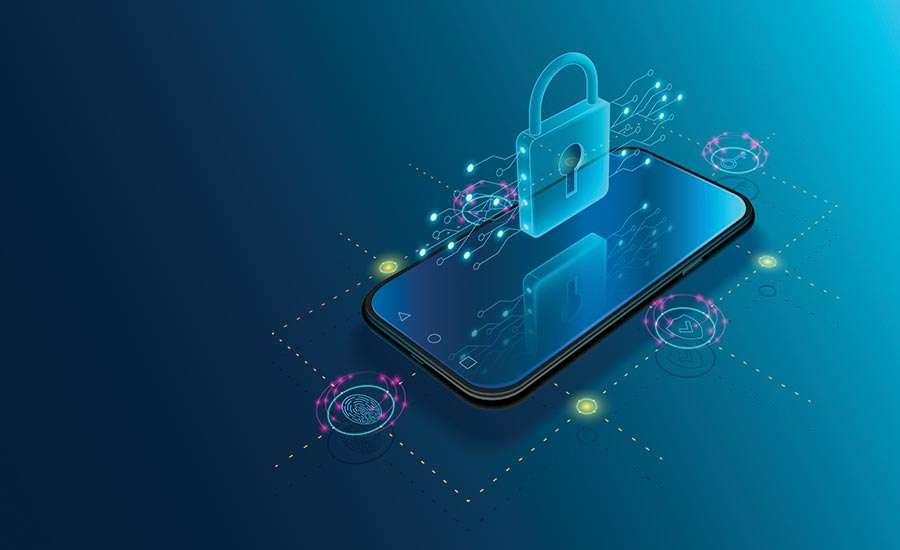Introduction:
In an era where our lives are intricately woven with smartphones, the looming threat of cyberattacks is ever-present. Securing your smartphone from potential hacking incidents demands a proactive approach. Here, we present seven strategic steps to bolster your smartphone’s defenses and thwart cyber adversaries.
1. Craft a Digital Fortress with a Dynamic Passcode:
- Devise a formidable password comprising a mix of upper and lower-case letters, numbers, and special characters.
- Dodge predictable choices like birthdays or common words to fortify your device against brute force attacks.
2. Implant a Cyber Sentinel: Activate Two-Factor Authentication (2FA):
- Empower 2FA for your accounts to introduce an extra layer of security.
- Require a secondary form of verification, transforming your smartphone into an impervious digital fortress.
3. Execute Regular Software Fortifications:
- Shield your smartphone by perpetually updating its operating system and applications.
- Embrace automated updates to ensure your device remains impervious to the latest cyber threats.
4. Navigate Permissions Prudently:
- Scrutinize app permissions meticulously before installation.
- Abstain from conferring unnecessary privileges that could jeopardize your smartphone’s security and compromise your privacy.
5. Mobilize Digital Guardians: Install a Robust Antivirus Shield:
- Select a reputable antivirus or mobile security application and maintain its currency.
- Routinely scan your device for lurking malware and other potential security breaches.
6. Enforce Wireless Vigilance:
- Fortify your Wi-Fi network with an unassailable password.
- Activate WPA3 encryption for an added layer of defense, and exercise caution when using public Wi-Fi for sensitive activities.
7. Establish a Data Sanctuary: Regular Backups are Your Guardian Angels:
- Institute routine backups of your smartphone’s data, encompassing contacts, photos, and vital files.
- In the event of a security breach, the ability to restore your device to a previous state becomes an invaluable line of defense.
Simple advice on phone security
When it comes to rejecting easy hacking attempts, casual phone users should start by following the fundamentals:
- Don’t ever leave your phone alone. The first and most important rule to keep by when in a public area is to always have your phone with you.
- Modify the default passcode on your phone. Those who know can take advantage of the basic, predictable default password that most phones have. Instead of using the often used “1234,” “0000,” and “2580” codes, try something more sophisticated.
- Control the Bluetooth security. When not in use, turn off your Bluetooth service and stay away from unsecured Bluetooth networks.
- Safeguard your credit card information and PIN. To store credit card details and PINs, use a secure app, or better yet, never store them on your phone.
Innovative Techniques to Stop Phone Hacking
There are other security precautions you can take if hacking is still a concern. But going too far will negate the whole point of owning a smartphone.
- Steer clear of unprotected public WiFi. Hackers frequently use public WiFi to target crucial sites, such bank accounts, which are frequently left unprotected because of low security regulations or none at all.
- Disable your autocomplete function. You can stop important personal data from being accessed by doing this.
- Delete your cookies, cache, and browsing history on a regular basis. Reducing your digital footprint is crucial for reducing the quantity of information that could be obtained by unscrupulous parties.
- Have an iPhone? Turn on “Find My iPhone.” You can find your phone if you misplace it before the hackers get a hold of it by activating the feature in your settings.
- Use a security app to improve defenses. Webroot provides an all-in-one Mobile Security for Android app for Android users, which not only gives antivirus protection but also lets you remotely locate, lock, and delete your phone in case you misplace it. Webroot provides a free safe web browser for iOS users to enhance mobile security on their iPhone and iPad.
Android phone security tips
- Lock It Down: Set Up a Strong Screen Lock:
- Start with a robust screen lock method such as a PIN, password, pattern, or biometric authentication (fingerprint or face recognition).
- Avoid using easily guessable patterns or PINs to enhance your phone’s physical security.
- Enable Find My Device:
- Activate the “Find My Device” feature on your Android phone.
- This allows you to locate, lock, or erase your device remotely in case it gets lost or stolen.
- Keep Your System Updated:
- Regularly update your Android operating system and apps to patch security vulnerabilities.
- Enable automatic updates for both system and app updates whenever possible.
- Install Apps from Trusted Sources Only:
- Download and install apps only from the official Google Play Store.
- Avoid sideloading apps from third-party sources, as these can pose security risks.
- Review App Permissions:
- Scrutinize and manage app permissions to control what data and features each app can access.
- Revoke unnecessary permissions for apps that don’t require certain functionalities.
- Use a VPN for Public Wi-Fi:
- When connecting to public Wi-Fi networks, use a reputable Virtual Private Network (VPN) to encrypt your internet connection and protect your data from potential snooping.
- Secure Your Google Account:
- Strengthen the security of your Google account linked to your Android device.
- Enable two-step verification, regularly review account activity, and use a strong, unique password.
- Regularly Back Up Your Data:
- Set up automatic backups for your Android device to Google Drive.
- This ensures you can restore your data in case of loss, theft, or a device malfunction.
- Install a Reliable Antivirus App:
- Choose a reputable antivirus app from the Google Play Store.
- Run regular scans to detect and remove any potential malware or security threats.
- Be Wary of Phishing and Social Engineering:
- Exercise caution when clicking on links in emails, text messages, or unfamiliar websites.
- Educate yourself about common phishing tactics and avoid sharing sensitive information with unverified sources.
IPhone security tips
- Activate Face ID or Touch ID:
- Enable Face ID or Touch ID for a secure and convenient biometric authentication experience.
- These features enhance the physical security of your iPhone, ensuring that only you can unlock it.
- Keep iOS Updated:
- Regularly update your iPhone’s operating system to the latest iOS version.
- These updates often include critical security patches that guard against potential vulnerabilities.
- Enable Find My iPhone:
- Activate the “Find My iPhone” feature to locate, lock, or erase your device remotely.
- This tool is invaluable in case your iPhone is lost or stolen, providing added security.
- Use Strong, Unique Passcodes:
- Set a strong alphanumeric passcode for your iPhone.
- Avoid easily guessable codes, and opt for a combination of letters, numbers, and symbols.
- App Store Only: Download Apps Wisely:
- Download and install apps exclusively from the official Apple App Store.
- Apple’s stringent app review process ensures a higher level of security and reduces the risk of malicious apps.
- Review App Permissions:
- Regularly check and manage app permissions in your iPhone settings.
- Only grant necessary permissions to apps, limiting access to sensitive data.
- Secure Your Apple ID:
- Strengthen the security of your Apple ID with two-factor authentication.
- Regularly review and update your Apple ID password, ensuring it’s unique and robust.
- iCloud Encryption and Backups:
- Enable iCloud encryption for added protection of your data.
- Regularly back up your iPhone to iCloud to ensure you can restore your data in case of loss or device replacement.
- Beware of Phishing:
- Exercise caution when receiving emails, messages, or calls asking for personal information.
- Verify the legitimacy of requests before sharing any sensitive data to protect against phishing attempts.
Here are some of the best tools and apps that can enhance the security of your mobile device:
- Mobile Security Apps:
- Lookout: Offers comprehensive mobile security with features like malware protection, device location tracking, and data backup.
- Bitdefender Mobile Security: Provides powerful antivirus and anti-malware protection along with features like web security and anti-theft capabilities.
- VPN Services:
- ExpressVPN, NordVPN, or CyberGhost: These virtual private network (VPN) services encrypt your internet connection, ensuring your data remains private, especially when using public Wi-Fi.
- Password Managers:
- LastPass, 1Password, or Dashlane: Helps generate and store complex, unique passwords for each of your accounts, reducing the risk of unauthorized access.
- Biometric Authentication Apps:
- Google Authenticator or Authy: Adds an extra layer of security with two-factor authentication, generating time-sensitive codes for account access.
- Anti-Theft Apps:
- Find My iPhone (iOS) or Find My Device (Android): Built-in tools that help you locate, lock, or erase your device remotely in case it’s lost or stolen.
- Firewall Apps:
- NetGuard (Android): Allows you to control which apps can access the internet, enhancing your device’s privacy and security.
- Encrypted Messaging Apps:
- Signal, WhatsApp, or Telegram: Offers end-to-end encryption for messages, ensuring your communications remain private and secure.
- Mobile Device Management (MDM) Solutions:
- VMware Workspace ONE, Microsoft Intune, or MobileIron: Ideal for businesses, these tools help manage and secure mobile devices within an organization, enforcing security policies and remotely managing devices.
- Ad Blockers:
- AdGuard (Android/iOS) or 1Blocker (iOS): Helps block intrusive ads and potential sources of malware while browsing, enhancing your online security.
- Secure Browsers:
- Brave Browser or Firefox Focus: Focus on privacy and security, blocking trackers and ads to provide a more secure browsing experience.
- Device Encryption:
- Built-in Encryption (iOS/Android): Enable device encryption to protect the data stored on your device. iOS devices come encrypted by default, while Android users can enable encryption in the settings.
Conclusion:
Your smartphone is not just a device; it’s a gateway to your digital identity. Elevating its security is not an option but a necessity in the face of escalating cyber threats. By integrating these seven strategic steps into your digital routine, you fortify your smartphone against hacking endeavors. Stay vigilant, stay informed, and embark on a proactive journey to shield your smartphone and preserve your digital sanctum.


